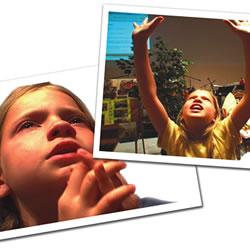I’ve just returned from a “Jesus camp.” I spent the weekend with several dozen students from a Presbyterian church in southern Colorado talking about how the entertainment media represents Christians. (One of the student leaders named the retreat “Crazy Uncle Pete Goes to Hollywood.”)
We were looking at the ways in which Hollywood depicts Christians, including the tradition of showing Protestants as aggressive, mean-spirited figures—a metaphor, no doubt, for Christians who like to throw their weight around the public square. In many cases, Christians in the movies aren’t just obnoxious loud mouths; they are bullies who shed blood.
Consider Martin Scorcese’s Cape Fear, where Robert DeNiro plays a psychopathic ex-con on a rampage. The movie is a remake of a black-and-white classic of the same name; but in Scorcese’s update, the killer has become a Pentecostal Christian. He shows off his Jesus tattoos, speaks of wanting to “baptize” his victims, and—when he meets his Maker— goes down praying in tongues.
Consider Robert Duvall’s The Apostle. While Duvall’s performance of a revivalist preacher is marked by sympathy, the movie’s plot is set in motion when the preacher brutally kills a man.
Consider Pulp Fiction, where Samuel L. Jackson’s ruthless gangster delivers a mini-sermon in full televangelist mode before executing his victims.
In film after film, Christians in Hollywood cinema are characterized by violent passion and psychotic rage. This tradition (like many Hollywood tropes) seems narrow at best and slanderous at worst, even for viewers like me who might sympathize with the notion that some Protestants too often take on roles as bullies in American culture.
The recent documentary film Jesus Camp reinforces these images. Jesus Camp visits a kids’ camp led by Becky Fischer, a Pentecostal children’s minister. Under Fischer’s direction, kids have radical prayer experiences, shouting down principalities and powers; they weep in warfare prayer, asking God to give America a Christian government and to halt abortion; and they are taught to see certain political movements—the presidency of George W. Bush, the Supreme Court confirmation of Samuel Alito—as answers to those prayers. We see kids in camouflage and military face paint, kids rolling on the floor in spiritual convulsions, kids—not yet out of grade school—weeping at their lack of faith.
Jesus Camp has frightened viewers across the country not because of the content of these children’s beliefs (it’s no news that many evangelicals oppose abortion and support George W. Bush) but because of the expression of those beliefs. In the logic of the film, all these activities are understood to be mainstream evangelical practices. “This is how evangelicals indoctrinate their kids,” the film seems to be saying. “You should be afraid. Be very, very afraid.” (Just to be sure, the film’s harrowing soundtrack helps you feel properly fearful.)
At my retreat this weekend it was fascinating to talk about Jesus Camp and other fear-mongering portrayals of evangelicals while we were attending, well, a Jesus camp. Some of the campers were lifelong Christians who had been attending camps and retreats all their lives. Now they had begun to come of age. Some had maintained the views instilled in them at a young age. Some had begun to see God and spirituality in a different way. Some held conservative political views; some adopted a more liberal stance; some fell somewhere in the middle. All they held in common, really, was love for Jesus and a desire to follow Him. In every other way, their views weren’t predictable or easily placed into neat categories.
We’re living in a time when evangelicalism is—as much as it is anything else— a creation of the media. As we see images of ourselves in the news and popular media, I hope we’ll all be able to do what we did at our Jesus camp this weekend: realize that we can talk back to those images and remind ourselves that we’re more diverse and dynamic than we appear in pop culture. As we do, we’ll begin the work of creating ourselves in a better image.
Patton Dodd is an editor for beliefnet.comm and the author of the acclaimed spiritual memoir My Far So Far.




